
The Muscogee, also known as the Mvskoke, Muscogee Creek or just Creek, and the Muscogee Creek Confederacy, are a group of related Indigenous peoples of the Southeastern Woodlands in the United States. Their historical homelands are in what now comprises southern Tennessee, much of Alabama, western Georgia and parts of northern Florida.

Okmulgee is a city in and the county seat of Okmulgee County, Oklahoma, United States, and is part of the Tulsa Metropolitan Area. The name is from the Muskogee word okimulgi, which means "boiling waters". The site was chosen because of the nearby rivers and springs. Okmulgee is 38 miles south of Tulsa and 13 miles north of Henryetta via US-75.

William Sampson Jr. was a Muscogee Nation painter, actor, and rodeo performer. He is best known for his performance as the apparently deaf and mute Chief Bromden in the 1975 film One Flew Over the Cuckoo's Nest and as Crazy Horse in the 1977 western The White Buffalo, as well as his roles as Taylor in Poltergeist II: The Other Side and Ten Bears in 1976's The Outlaw Josey Wales.

The Yuchi people are a Native American tribe based in Oklahoma. Their original homeland was in the southeast of the present United States.
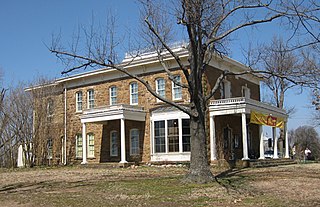
The Five Civilized Tribes Museum in Muskogee, Oklahoma, showcases the art, history, and culture of the so-called "Five Civilized Tribes": the Cherokee, Chickasaw, Choctaw, Muscogee (Creek), and Seminole tribes. Housed in the historic Union Indian Agency building, the museum opened in 1966.

Bacone College, formerly Bacone Indian University, is a private college in Muskogee, Oklahoma. Founded in 1880 as the Indian University by missionary Almon C. Bacone, it was originally affiliated with the mission arm of what is now American Baptist Churches USA. Renamed as Bacone College in the early 20th century, it is the oldest continuously operated institution of higher education in Oklahoma. The liberal arts college has had strong historic ties to several tribal nations, including the Muscogee and Cherokee. The Bacone College Historic District has been on the National Register of Historic Places listings in Muskogee County, Oklahoma since 2014.

The Muscogee Nation, or Muscogee (Creek) Nation, is a federally recognized Native American tribe based in the U.S. state of Oklahoma. The nation descends from the historic Muscogee Confederacy, a large group of indigenous peoples of the Southeastern Woodlands. Official languages include Muscogee, Yuchi, Natchez, Alabama, and Koasati, with Muscogee retaining the largest number of speakers. They commonly refer to themselves as Este Mvskokvlke. Historically, they were often referred to by European Americans as one of the Five Civilized Tribes of the American Southeast.
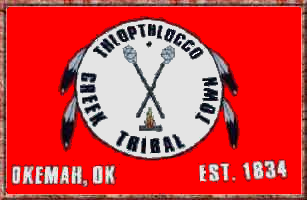
Thlopthlocco Tribal Town is both a federally recognized Native American tribe and a traditional township of Muscogee Creek Indians, based in Oklahoma. The tribe's native language is Mvskoke, also called Creek.

The Kialegee Tribal Town is a federally recognized Native American tribe in Oklahoma, as well as a traditional township within the former Muscogee Creek Confederacy in the American Southeast. Tribal members pride themselves on retaining their traditions and many still speak the Muscogee language. The name "Kialegee" comes from the Muscogee word, eka-lache, meaning "head left."
The Alabama–Quassarte Tribal Town is both a federally recognized Native American tribe and a traditional township of Muskogean-speaking Alabama and Coushatta peoples. Their traditional languages include Alabama, Koasati, and Mvskoke. As of 2014, the tribe includes 369 enrolled members, who live within the state of Oklahoma as well as Texas, Louisiana, and Arizona.
The Bacone school or Bacone style of painting, drawing, and printmaking is a Native American intertribal "Flatstyle" art movement, primarily from the mid-20th century in Eastern Oklahoma and named for Bacone College. This art movement bridges historical, tribally-specific pictorial painting and carving practices towards an intertribal Modernist style of easel painting. This style is also influenced by the art programs of Chilocco Indian School, north of Ponca City, Oklahoma, and Haskell Indian Industrial Training Institute, in Lawrence, Kansas and features a mix of Southeastern, Prairie, and Central Plains tribes.
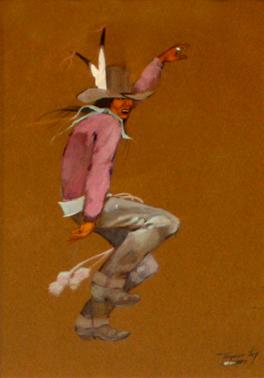
Jerome Richard Tiger was a Muscogee Nation-Seminole painter from Oklahoma. Tiger produced hundreds of paintings from 1962 until his death in 1967.
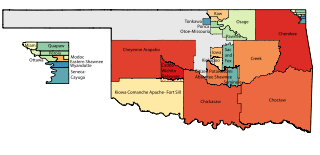
Oklahoma Tribal Statistical Area is a statistical entity identified and delineated by federally recognized American Indian tribes in Oklahoma as part of the U.S. Census Bureau's 2010 Census and ongoing American Community Survey. Many of these areas are also designated Tribal Jurisdictional Areas, areas within which tribes will provide government services and assert other forms of government authority. They differ from standard reservations, such as the Osage Nation of Oklahoma, in that allotment was broken up and as a consequence their residents are a mix of native and non-native people, with only tribal members subject to the tribal government. At least five of these areas, those of the so-called five civilized tribes of Cherokee, Choctaw, Chickasaw, Creek and Seminole, which cover 43% of the area of the state, are recognized as reservations by federal treaty, and thus not subject to state law or jurisdiction for tribal members.
James Pepper Henry is a Native American museum director and vice-chairman of the Kaw Nation. He is the executive director of the First Americans Museum in Oklahoma City, Oklahoma, which opened on 18 September 2021.
Sharp v. Murphy, 591 U.S. ___ (2020), was a Supreme Court of the United States case of whether Congress disestablished the Muscogee (Creek) Nation reservation. After holding the case from the 2018 term, the case was decided on July 9, 2020, in a per curiam decision following McGirt v. Oklahoma that, for the purposes of the Major Crimes Act, the reservations were never disestablished and remain Native American country.
Jimmie Carole Fife Stewart is a Muscogee (Creek) art educator, fashion designer, and artist. After graduating from the Chilocco Indian School and taking courses at the University of Arizona, she earned a degree from Oklahoma State University and began working as a teacher. After a six-year stint working for Fine Arts Diversified, she returned to teaching in 1979 in Washington, Oklahoma. Primarily known as a painter, using watercolor or acrylic media, Fife-Stewart has also been involved in fashion design. Her works have been shown mostly in the southwestern United States and have toured South America. Having won numerous awards for her artworks, she was designated as a Master Artist by the Five Civilized Tribes Museum in 1997.
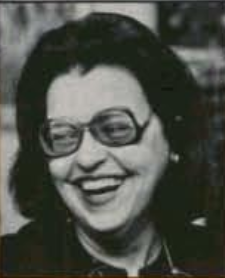
Valjean McCarty Hessing was a Choctaw painter, who worked in the Bacone flatstyle. Throughout her career, she won 9- awards for her work and was designated a Master Artist by the Five Civilized Tribes Museum in 1976. Her artworks are in collections of the Heard Museum of Phoenix, Arizona; the Philbrook Museum of Art in Tulsa, Oklahoma; the Southern Plains Indian Museum in Anadarko, Oklahoma; and the Wheelwright Museum of the American Indian of Santa Fe, New Mexico, among others.
McGirt v. Oklahoma, 591 U.S. ___ (2020), was a landmark United States Supreme Court case which held that the domain reserved for the Muscogee Nation by Congress in the 19th century has never been disestablished and constitutes Indian country for the purposes of the Major Crimes Act, meaning that the State of Oklahoma has no right to prosecute American Indians for crimes allegedly committed therein. The Oklahoma Court of Criminal Appeals applied the McGirt rationale to rule nine other Indigenous nations had not been disestablished. As a result, almost the entirety of the eastern half of what is now the State of Oklahoma remains Indian country, meaning that criminal prosecutions of Native Americans for offenses therein falls outside the jurisdiction of Oklahoma’s court system. In these cases, jurisdiction properly vests within the Indigenous judicial systems and the federal district courts under the Major Crimes Act.

Ella Jean Hill Chaudhuri was an American community leader, activist, and author. She was a member of the Muscogee (Creek) Nation, executive director of the Tucson Indian Center, and director of the Traditional Indian Alliance. She was inducted into the Arizona Women's Hall of Fame posthumously, in 2013.

Shelly Crow was an American nurse and nursing administrator, who worked for the Indian Health Service and was the first Muscogee woman elected to serve in the Muscogee Nation's executive branch. She was fourth elected Second Chief of the nation, serving from 1992 to 1996 in the administration of Chief Bill Fife.












